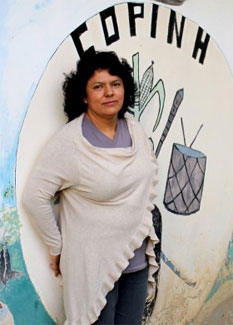In a world where rapacious growth moves profits and stock markets, deadly conflicts are becoming commonplace as what’s left of the world’s undeveloped land is gobbled up for exploitation. When people stand against this destruction -and being kicked off their land – they too often are murdered.
That’s why the International Criminal Court (ICC) announced a new policy. Their mission of investigating “crimes against humanity” is expanding beyond war crimes and genocide to environmental destruction and illegal land grabs from indigenous people.
Corporations and corrupt politicians can now be held criminally responsible under international law.
This is a landmark shift in international criminal justice and could reshape how business is done in developing countries, says Global Witness, a non-profit that’s been tracking this for years and urging action.
Berta Cáceres was murdered in Honduras this year.
Based in The Hague, the Court prosecutes the world’s worst crimes where domestic courts are unwilling or unable to act. Other new priorities are: crimes against children; gender-based violence; cultural destruction; arms and human trafficking, terrorism and financial crimes.
Monsanto will face the ICC October 12-16 for crimes against nature and humanity, and ecocide. It faces a trial for its steady stream of toxic products which have permanently damaged the environment and caused illness or death for thousands of people: PCBs; 2,4,5 T (dioxin component of Agent Orange); Roundup; and bovine growth hormones.
Millions Evicted From Their Land
Millions of people have been evicted from their land – illegally and often violently – by the global rush by big agriculture (ie, palm plantations), mining, enormous hydroelectric dams, logging, drilling, toxic dumping etc. Colluding governments have allowed corporations to take over tens of millions of hectares of land in the past 10 years, reports The Guardian.
Last year was the deadliest yet. Three people were murdered every week as they defended their land from theft and destructive industries, says Global Witness.
“Chasing communities off their land and trashing the environment has become an accepted way of doing business in many resource-rich yet cash-poor countries,” notes Gillian Caldwell, Executive Director. “Today’s decision by the ICC shows the age of impunity is coming to an end. Company bosses and politicians complicit in violently seizing land, razing tropical forests or poisoning water sources could soon find themselves standing trial in the Hague alongside war criminals and dictators. The ICC’s interest could help improve the lives of millions of people and protect critical ecosystems.”
“National governments and legislators should follow suit. Land rights must be strengthened in countries that sell land, and respected by the companies that invest in it. A far stronger legal architecture is required internationally to bring an end to the human suffering and environmental cost of the global trade in land.”
In Latin America and South Asia, a surge in investments on undeveloped land has led to murders by hired assassins or by police as people defend their rights to the land.
“Tackling land-grabbing will also help address some of the causes of climate change, since deforestation is very often a result,” says Richard Rogers at Global Diligence, an international criminal law firm.
Honduras, The Most Dangerous Country
Global Citizen ranks Honduras as the most dangerous country for environmental activists right now.
This year, Berta Cáceres won the prestigious Goldman Environmental Prize for leading a successful grassroots effort that forced the world’s largest dam builder (China’s state-owned Sinohydro) to pull out of building the 17-dam Agua Zarca complex. Months later, she was murdered when two anonymous shooters forced themselves into her home at 1AM.
As co-founder of the Council of Popular and Indigenous Organizations of Honduras (COPINH), she worked for decades to protect lands from megaprojects like dams, mines and logging, drawing the ire of loggers, palm oil interests, and dam-builders. She and her colleagues faced ongoing harassment and threats for their peaceful protests.
Two weeks after Berta’s death, her colleague Nelson Garcia was murdered outside his house, while trying to prevent the eviction of 150 families from their land for the dam. “They started to tear down the houses, they destroyed the maize, the banana trees, and the yuca plantations,” exclaimed Tomas Gomez, another activist with COPINH.
That prompted the Netherlands Development Finance Company to withdraw from the dam project. But because there are always other financial interests waiting in the wings, the dam remains under construction.
In Brazil, indigenous people are in a “war” against megadams and agriculture moving deeper into the Amazon.
While financial institutions across the world are implicated in land deals and ensuing destructive projects, China’s tentacles are easily felt in Latin America. Since 2005, China has invested $119 billion to finance mines, dams and even a transcontinental railroad. It’s a major player in the bigger-than-Panama Canal project in Nicaragua.
The railway, for example, would require cutting and fragmenting forests in one of Peru’s most biodiverse areas and where indigenous people still live.
We’ve written extensively on renaissance of mega-dams, which are displacing tens of thousands of people and destroying pristine ecosystems across Latin America, and soon Africa. In 2014 alone, 829 new dams got the go-ahead in South America, according to Hydroworld.com. Many of the projects have the sole purpose of supplying cheap energy to corporations building mines and other extractive activities. All this stokes climate change.
Read our article, The Dark Side of Peru and Elsewhere .. For Environmental Activists.

